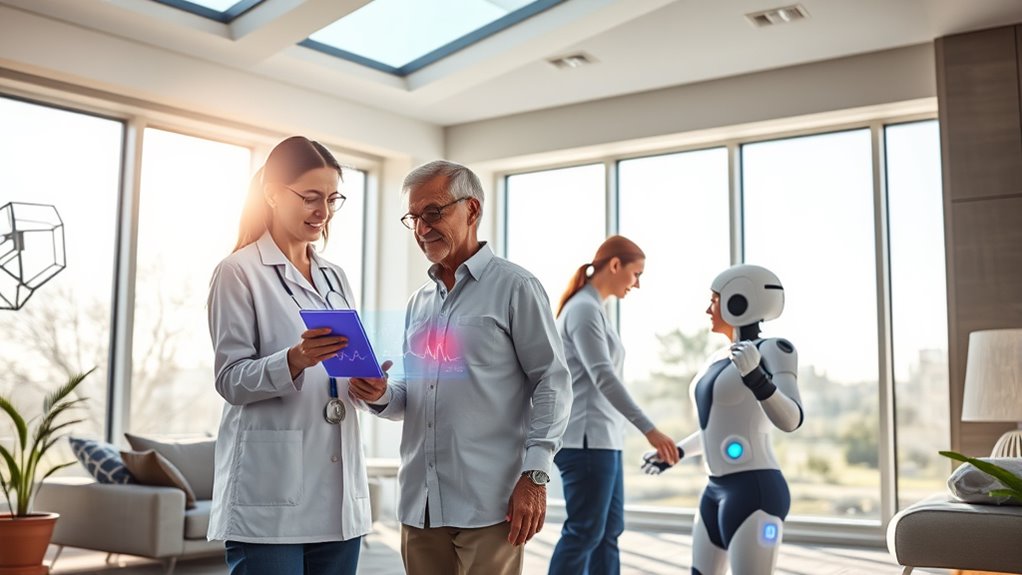By 2025, your role as a caregiver will blend advanced technology with heartfelt, holistic support. You’ll rely more on smart devices, remote health monitors, and AI-driven data to make informed decisions. At the same time, emotional connection remains essential, so you’ll balance tech use with compassion and active listening. This evolution means you’ll need to develop technical skills alongside emotional intelligence. Keep exploring, and you’ll discover how these changes will shape your caregiving journey even further.
Key Takeaways
- Caregivers will increasingly rely on advanced technology for real-time health monitoring and seamless communication with healthcare providers.
- Emotional intelligence and compassionate engagement will remain essential alongside technical skills and digital platform management.
- Data analytics and AI tools will support personalized care plans, enabling more proactive and tailored caregiving approaches.
- Holistic care models integrating medical, emotional, and social support will become standard, emphasizing emotional connection and well-being.
- Caregivers will balance technology use with human warmth, ensuring emotional needs like comfort and companionship are prioritized.

By 2025, the role of caregivers is expected to evolve markedly as technology, healthcare, and societal needs continue to intersect. You’ll find yourself relying more on innovative tools designed to streamline tasks and enhance care delivery. Technology integration will become a core part of your responsibilities, enabling you to monitor health conditions remotely, manage medications more effectively, and communicate with healthcare professionals seamlessly. Wearable devices and smart home systems will give you real-time data, helping you respond quickly when issues arise. This integration doesn’t replace the human touch but enhances your ability to provide timely, precise care. You’ll also find yourself managing digital platforms that allow for better coordination among family members, medical teams, and support networks. These tools will help you stay organized, track progress, and adjust care plans as needed, giving you confidence in the quality of support you provide.
However, technology’s role isn’t solely about efficiency—it’s also about emotional support. As a caregiver, you’ll need to balance the use of tech with compassion. While devices can remind your loved ones to take their medication or alert you to health anomalies, they can’t replace the warmth and reassurance you offer through your presence and words. In fact, emotional support will be even more indispensable as technology becomes more embedded in daily routines. You’ll be expected to interpret data not just to address physical health but also to respond to emotional needs. For example, if a loved one feels isolated or anxious, your ability to provide comfort, listen actively, and foster a sense of security will be paramount. Technology can facilitate communication, but it’s your empathy that will truly make a difference in their overall well-being.
Additionally, advances in AI-powered data analytics will support you in making more informed decisions and tailoring care to individual needs. Societal expectations around caregiving are shifting. You’ll be encouraged to adopt a holistic approach—integrating medical care with emotional and social support. This means not only managing health metrics but also creating an environment where your loved ones feel valued, understood, and emotionally connected. As new tools emerge, you’ll need to learn how to leverage them effectively without losing sight of the human element. The combination of advanced technology and genuine emotional engagement will define your role, making caregiving more dynamic and impactful. By 2025, your ability to blend these aspects will be essential in providing all-encompassing, compassionate care that addresses both physical and emotional health needs.
Frequently Asked Questions
How Will Caregiver Training Adapt to Emerging Technologies by 2025?
By 2025, caregiver training will embrace emerging technologies like virtual simulations and personalized learning. You’ll be able to practice real-life scenarios in safe, virtual environments, boosting your skills and confidence. Personalized learning programs will tailor training to your needs, ensuring you focus on areas that require improvement. This tech-driven approach makes training more effective, flexible, and engaging, preparing you better to provide quality care in an evolving healthcare landscape.
What Legal Rights Will Caregivers Have in Future Healthcare Systems?
You might believe caregivers have limited rights, but future healthcare systems will empower you through stronger legal rights and advocacy frameworks. As technology advances, you’ll gain more authority in decision-making and protection of your role. Expect laws to evolve, ensuring your voice is heard, your contributions recognized, and your rights safeguarded. This shift will foster greater confidence and support, making your caregiving journey more secure and respected in the years ahead.
How Will Caregiver Mental Health Support Evolve With Technological Advancements?
You’ll see mental health support for caregivers evolve with technological advancements by offering more virtual support options and accessible mental health resources. These innovations make it easier for you to access counseling, peer groups, and stress management tools from home. As technology advances, expect personalized mental health solutions that fit your schedule, helping you maintain your well-being while caring for others. This ongoing evolution aims to make support more convenient and effective.
What Role Will AI Play in Supporting Caregiver Decision-Making?
Ever wonder how AI decision support will change your caregiving? You’ll find that AI seamlessly integrates with caregiver tech, providing real-time insights and personalized recommendations. This support helps you make smarter choices quickly, easing your decision-making burdens. As AI advances, it’ll become your trusted partner, empowering you with data-driven guidance that enhances care quality and reduces stress. Isn’t that the future every caregiver deserves?
How Will Caregiver Compensation Models Change by 2025?
By 2025, you’ll see changes in caregiver compensation models driven by new financial incentives and innovative compensation structures. Rather than traditional pay, models may include performance-based rewards, stipends, or digital incentives that better reflect caregiving complexity. These shifts aim to motivate and support caregivers, making the role more sustainable. You’ll benefit from a system that recognizes your essential contributions through more flexible, transparent, and equitable financial incentives.
Conclusion
As you step into 2025, remember that change is the only constant. Caregiver roles will continue to evolve, blending technology with compassion. Embrace these shifts, knowing that adaptability is your greatest asset. Like a river carving its path through rock, your dedication will shape the future of caregiving. Stay flexible, stay compassionate, and trust that, with each challenge, you’re building a brighter, more connected tomorrow. After all, a journey of a thousand miles begins with a single step.









